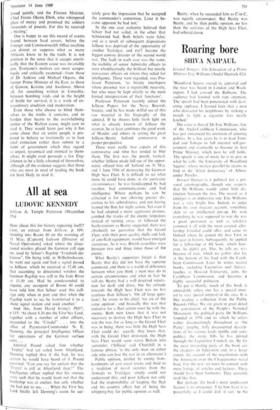All at sea
LUDOVIC KENNEDY
How about this for history repeating itself? First, an extract from Jellicoe, p 109: 'Striding into Room 40 on the morning of 31 May, [Captain] Jackson [Director of Naval Operations] asked where the direc- tional wireless placed the German call sign DK used by Scheer's flagship "Friedrich der Grosse". On being told, in Wilhelmshaven, he went out again and had a signal passed to Jellicoe, which he received at 12.48 am, that according to directional wireless the German flagship was still in the Jade River at 11.10 am. Had he condescended to inquire, any occupant of Room 40 could have told him that Scheer used this call- sign only when in port and that when the flagship went to sea he transferred it to a shore signal station and used another.'
And this, from David Irving's PQI7, p 115: 'At about 8.30 pm the First Sea Lord, together with a number of other officers, descended to the "Citadel" . . . into the office of Paymaster-Commander N. E. Denning, the principal Intelligence Officer for operations of the German surface units ...
Admiral Pound asked him whether "Tirpitz" had yet sailed from Altenfjord. Denning replied that if she had, he was certain he would have heard of it. Pound persisted, "Can you say for certain that the 'Tirpitz' is still at Altenfjord. then?" The Intelligence officer replied that his sources were such that he would learn not that the battleship was at anchor, but only whether she had put to sea.... When the First Sea Lord finally left Denning's room he cer-
tainly gave the impression that he accepted the commander's contention. Later it be- came apparent he had not.'
In the one case authority believed that Scheer had not sailed, in the other that Schniewind had. Both beliefs were false; and as a result of subsequent dispositions Jellicoe was deprived of the opportunity of another Trafalgar, and PQI7 became the biggest convoy disaster of the second world war. The fault in each case was the same, the inability of senior Admiralty officers to trust wholeheartedly the brilliant but mostly non-career officers on whom they relied for intelligence. These were regarded, says Pro- fessor Patterson, 'as brainy interlopers whose presence was a regrettable necessity, but who must be kept strictly to the most limited interpretation of their functions'.
Professor Patterson recently edited the Jellicoe Papers for the Navy Records Society, and he has made skilful use of this raw material in his biography of the admiral. If he throws little fresh light on what is already known of Jellicoe the seaman, he at least continues the good work of Marder and others in setting the great Jellicoe/ Beatty Jutland controversy in proper perspective.
There were really two aspects of this controversy and time has tended to blur them. The first was the purely tactical, whether Jellicoe made full use of the oppor- tunity offered him off Jutland on 31 May and 1 June 1916 of destroying the German High Seas Fleet. It is difficult to see what more he could have done, in the particular circumstances: he was handicapped by bad weather, bad communications and bad intelligence. Where perhaps he can be criticised is for not allowing greater dis- cretion to his subordinates, and not having trained the fleet for night action. Yet even if he had adopted a more aggressive posture, combed the tracks of the enemy torpedoes instead of turning away, or followed the battle-cruisers as Beatty suggested, there was absolutely no guarantee that the Grand Fleet, with their poor quality shells and lack of anti-flash equipment, would have emerged victorious. As it was, British casualties were between two and three times those of the enemy.
What Beatty's supporters forget is that Beatty that day did not have the supreme command, and there is a world of difference between what you think a man may do in certain circumstances and what in fact he will do. Beatty had a well deserved reputa- tion for dash and drive, but his attitude towards the High Seas Fleet was no less cautious than Jellicoe.s. 'On all large ques- tions', he wrote to his chief, 'we are of the same opinion', and basically this was that initiative for a fleet action must lie with the enemy. Both men knew that it was not necessary to destroy the High Seas Fleet to win the war, for as long as the Grand Fleet was in being, there was little the High Seas Fleet could do: equally they knew that, with the Grand Fleet destroyed, the High Seas Fleet would soon starve Britain into surrender. ('Jellicoe' said Churchill in a famous phrase, `is the only man on either side who can lose the war in an afternoon'.)
Public opinion, nettled by enemy bom- bardments of east coast towns and bred to a tradition of naval victories from the Armada to Trafalgar, simply could not understand this; and poor Jellicoe not only had the responsibility of keeping the fleet and his country afloat but of being the whipping-boy for public opinion as well. Beatty, when he succeeded him as C-in-C, was equally circumspect. But Beatty was Beatty, and by then public opinion, no less than the activities of the High Seas Fleet, had sobered down.


































 Previous page
Previous page